Photo courtesy of www.woodlandtrust.org.uk
Conservation, Biodiversity & The Welfare of Our Woodlands
Woodlands are our heritage and are vital habitats for biodiversity. Louise Hoskins celebrates a special community woodland in Norfolk and tells a sad tale of how poor woodland work has destroyed valuable wildlife habitat.
I volunteer in a beautiful woodland in the Wensum valley, west of Norwich, in Norfolk. I came here as a WWOOFer in February and March 2010. I was humbled and grounded by the variety of habitats and species here, and the intuitive management of the woodlands owner. I am now a part of the team and volunteer here for a few months a year. This site is primarily managed for the wildlife, with a smaller area of ancient hazel coppice in which the humans can play. Storytellers come and teach children through tales and song. Sensory camps are held here for children with special needs focusing on the senses of hearing, sight, touch and the noticeable change in atmosphere experienced in moving between the woodland and the contained patch of bamboo. There is a vast reed bed around the edge of which wood cock and reed warblers nest, and deer forage. The site also has a large blackthorn thicket in which Nightingales nest. Nightingales are officially endangered.
From the amount of different habitats, this feels like a place that must have a very industrious history but it now has been reclaimed by wildlife as a haven from the open spaces around. It has been a brilliant place for me to come and learn the art of coppicing, traditional sustainable crafts, woodland management and stepping lightly on the land.
Unfortunately, there are power lines that run through the land. They run over the bamboo island, through the reed bed, over the dense blackthorn thicket and off out into the rest of Norfolk. The power lines mean biannual maintenance work by the energy company, and in the time of the woodlands current management there has never been a problem.
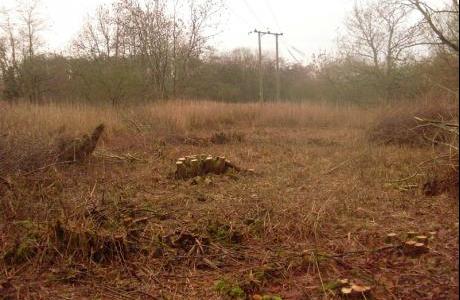
This year was different and the maintenance company got it wrong. An in depth meeting was held with the maintenance company, and the trees to be cut and trimmed were decided upon but this information did not reach the operatives that carried out the work. Trusting that the operatives were aware of the plans in place, they were left to work unsupervised, and when the owner of the woodlands, returned, she found what looks like a super highway cut through the reed bed, through the blackthorn thicket, through the bamboo island. Vital shrub margins along the edge of the reed bed have been decimated. The shrub margins themselves are an NVC (Natural Vegetation Classification) in their own right. A third of the ancient blackthorn thicket has been destroyed.
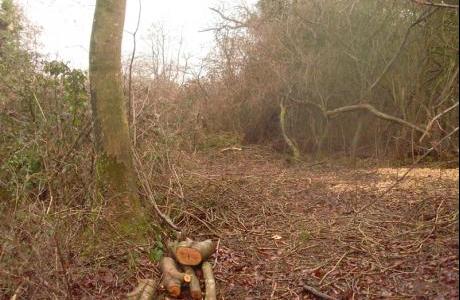 decimated blackthorn thicket
decimated blackthorn thicket
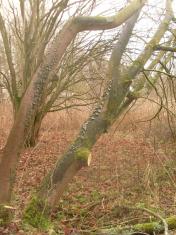 random cutting makes trees unstableThere had been no attempt made to look at the site immediately before the work was started. The blackthorns do not grow anywhere the height of the power lines, branches and trunks were cut that would have no impact if they fell, and yet obviously over hanging branches have been left, trees have been left unstable, making them more likely to fall on the lines. The stumps have been cut into with a cross hatched pattern, causing them to rot easily, thus making them unable to produce any harvestable re-growth.
random cutting makes trees unstableThere had been no attempt made to look at the site immediately before the work was started. The blackthorns do not grow anywhere the height of the power lines, branches and trunks were cut that would have no impact if they fell, and yet obviously over hanging branches have been left, trees have been left unstable, making them more likely to fall on the lines. The stumps have been cut into with a cross hatched pattern, causing them to rot easily, thus making them unable to produce any harvestable re-growth.
More awareness is needed
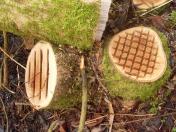 cross hatchingI do not wish to name this company nor want to incite hatred towards them, I merely want to bring awareness to this situation and to the welfare of our woodlands in general. They are so important for the wildlife that live in them and for the humans that rely on them. More attention is needed to what makes the woodland tick. There must be an intelligent and insightful compromise when dealing with the necessary maintenance work on sites of this delicate nature and if left in the wrong hands, hands of people ignorant to these delicate ecosystems, our woodlands will be destroyed before we know it. There is an example of this kind of ignorance here and it is just a matter of waiting for the spring to take hold of the days to see what has been destroyed forever.
cross hatchingI do not wish to name this company nor want to incite hatred towards them, I merely want to bring awareness to this situation and to the welfare of our woodlands in general. They are so important for the wildlife that live in them and for the humans that rely on them. More attention is needed to what makes the woodland tick. There must be an intelligent and insightful compromise when dealing with the necessary maintenance work on sites of this delicate nature and if left in the wrong hands, hands of people ignorant to these delicate ecosystems, our woodlands will be destroyed before we know it. There is an example of this kind of ignorance here and it is just a matter of waiting for the spring to take hold of the days to see what has been destroyed forever.
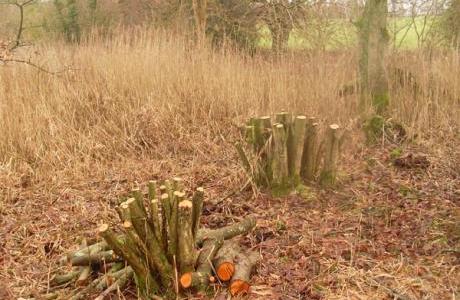 Bad coppicing
Bad coppicing





